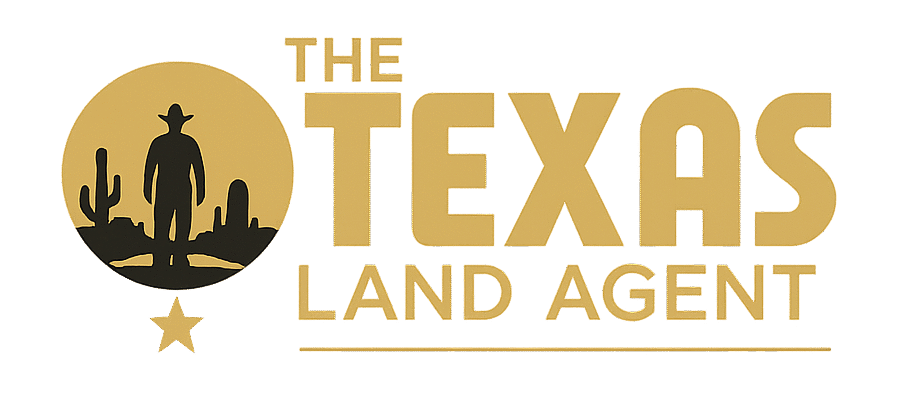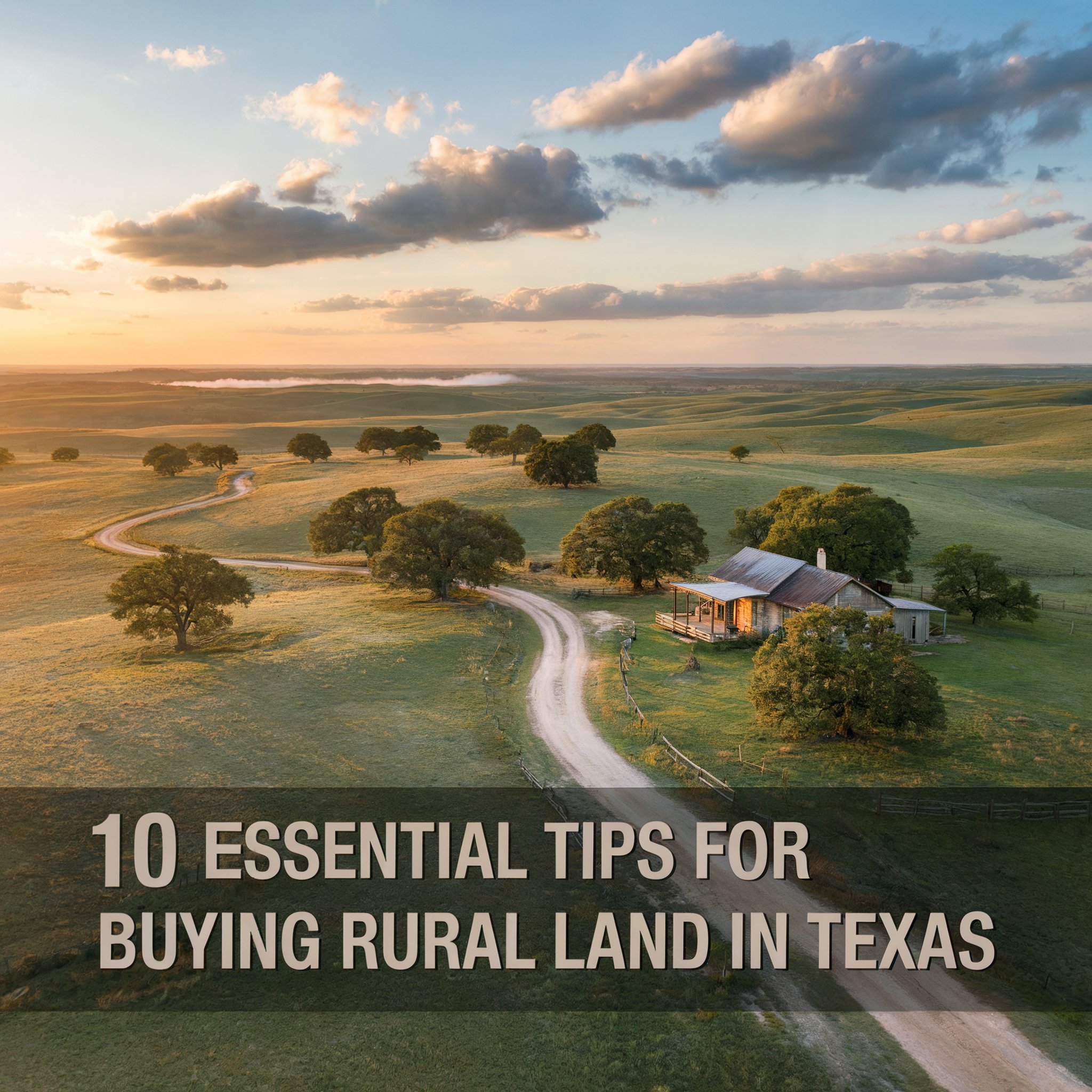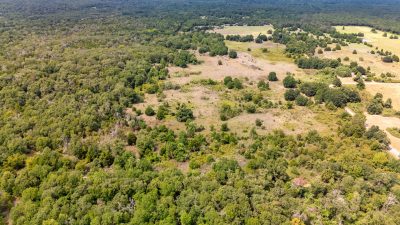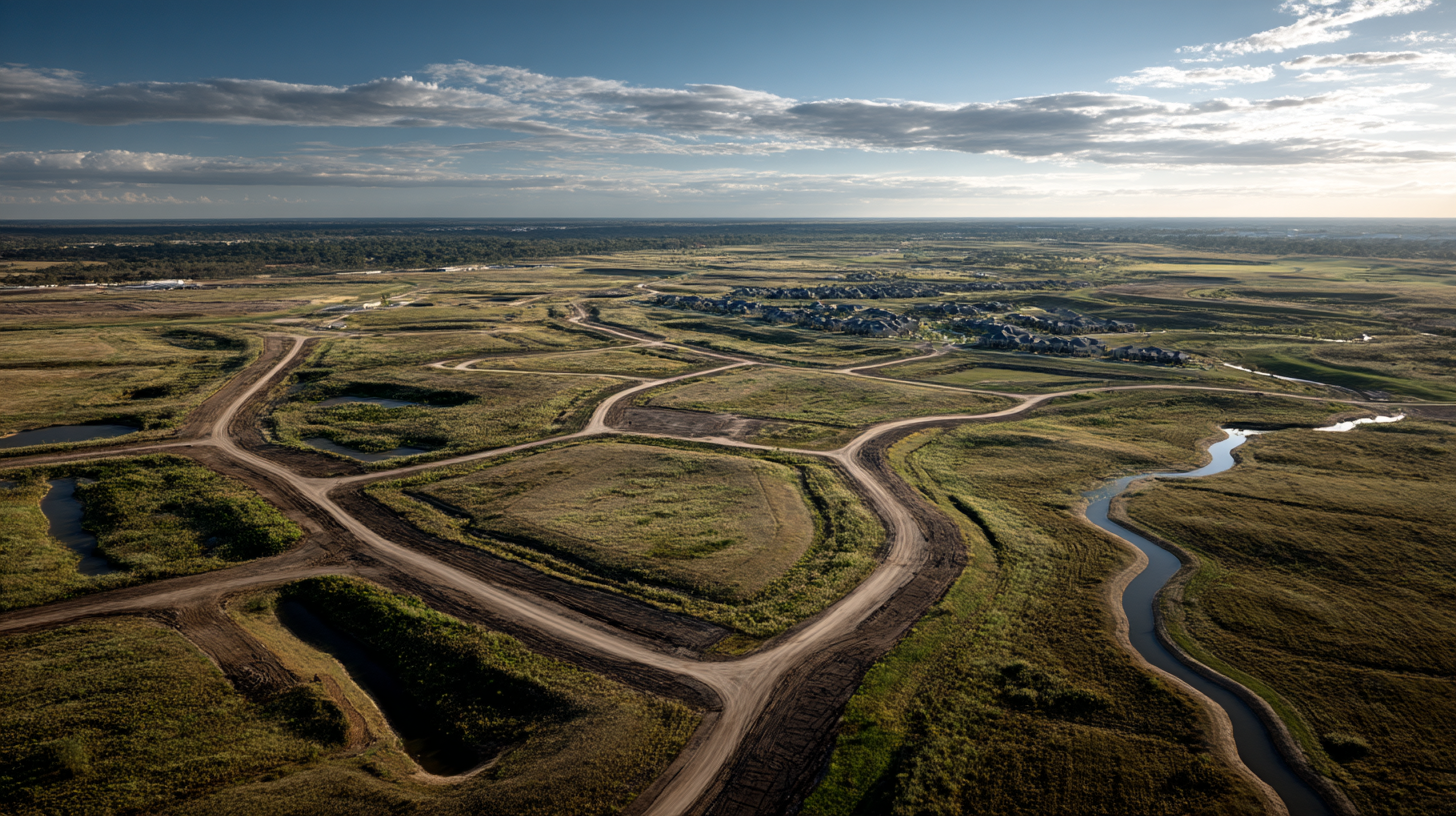Why Buying Texas Rural Land Requires Extra Caution
Buying rural land in Texas isn’t just about finding a pretty piece of property with a nice view (though that’s definitely a bonus!). It’s about making a smart investment in your freedom, lifestyle, and future opportunities.
Let me be straight with you—I’ve seen too many eager buyers rush into land purchases without doing their homework. And trust me, that’s a recipe for regret. Whether you’re dreaming of a homestead where you can grow your own food, a weekend getaway from city life, or a place to eventually retire, you need more than just enthusiasm to make a smart purchase.
From hidden zoning restrictions to water rights complications, rural land purchases come with unique challenges that city properties simply don’t have. Let’s walk through the 10 essential tips that will help you avoid costly mistakes and find land that truly matches your dreams when buying rural land in Texas.
Tip #1: Get Crystal Clear on Your Land Purpose
Before you even start browsing listings, ask yourself: “What exactly am I going to do with this land?”
Are you planning to:
- Build a primary residence where you’ll live year-round?
- Create a weekend retreat or hunting cabin?
- Start a small farm or raise livestock?
- Hold the land as a long-term investment?
Your intended use directly impacts what kind of property you should be looking for. For instance, if you’re planning to farm, soil quality becomes crucial. For a homestead, you’ll need land that can accommodate a well and septic system.
Take it from someone who’s seen the consequences—buying land without a clear purpose often leads to discovering it doesn’t actually suit your needs after you’ve already signed the papers.
Tip #2: Decode Zoning and Land Use Restrictions Before You Buy
Here’s something many first-time land buyers don’t realize: just because land is rural doesn’t mean you can do whatever you want with it.
Even in the wide-open spaces of Texas, you’ll encounter:
- County zoning ordinances that may restrict certain activities
- Deed restrictions from previous owners that can limit what you build
- Agricultural or conservation easements that might affect development
- HOA rules (yes, even some rural properties have them!)
Real-world example: I recently spoke with a buyer who purchased 15 acres planning to bring in a manufactured home while building their dream house—only to discover the deed restrictions explicitly prohibited mobile or manufactured homes. Always check with the county appraisal district or planning office before making an offer.
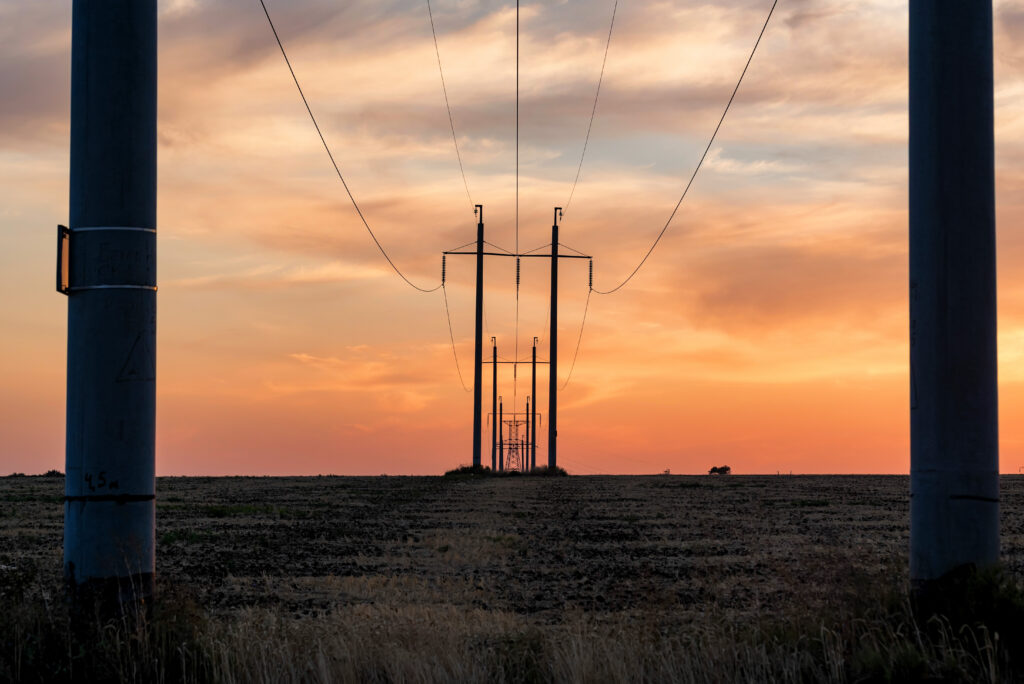
Tip #3: Don’t Assume Utilities Are Available (They Often Aren’t)
When you live in the city, you take for granted that water comes from the tap and lights turn on with a flip of a switch. In rural Texas, that’s not always the case.
Here’s what you need to investigate:
- Water access: Is there a well already? If not, how deep will you need to drill? Or is there a rural water line nearby?
- Electricity: How far is the nearest power line? (Bringing power even a quarter mile can cost thousands!)
- Internet options: Can you get fiber, cable, or will you need satellite?
- Septic requirements: Is the soil suitable for a conventional septic system, or will you need a more expensive aerobic system?
Pro tip: Ask the seller for utility bills or estimates for bringing services to the property. This can save you from budget-busting surprises later.
Tip #4: Evaluate the Land’s Soil Quality and Topography
Not all dirt is created equal, y’all. The soil beneath your feet can make or break your rural land experience.
Take time to:
- Walk the entire property after a rainstorm (look for standing water)
- Check for rocky areas that might complicate building or planting
- Look for signs of erosion or drainage issues
- Consider how the land’s slope might affect construction costs
You can access free soil maps through the USDA website, but nothing beats bringing in an expert for properties you’re serious about. This is especially important if you’re planning to grow crops, raise animals, or install a septic system.
Tip #5: Always, Always Get a Professional Land Survey
I can’t stress this enough—skipping a survey is penny-wise and pound-foolish.
A proper land survey will:
- Confirm the exact boundaries of your property
- Identify any encroachments (like a neighbor’s fence on your land)
- Show easements that might affect your use of the property
- Verify road access and frontage
While it might seem expensive up front ($500-$2,000 depending on the property), a survey can prevent disputes and legal headaches that could cost tens of thousands down the road.
Tip #6: Understand Texas Water Rights (They’re Complicated!)
Water is liquid gold in Texas, and the rights to it aren’t always straightforward.
You’ll need to understand:
- Surface water rights (for ponds, creeks, or streams on the property)
- Groundwater rights (which can be regulated by local groundwater conservation districts)
- Water access during drought conditions
- Any shared water resources with neighboring properties
This is an area where consulting with a real estate attorney who specializes in rural property is worth every penny. Water disputes in Texas can get nasty—better to know exactly what you’re buying.
Tip #7: Research All Easements and Access Rights
An easement is someone else’s legal right to use part of your property, and they’re extremely common on rural land.
Common easements to watch for:
- Utility easements for power lines or pipelines
- Neighboring property access easements (especially if your land is between them and a road)
- Oil, gas, or mineral rights easements
- Conservation easements that limit development
When reviewing your title commitment, pay special attention to the exceptions section—this is where easements will be listed. Don’t be afraid to ask your title company to explain anything you don’t understand.
Tip #8: Secure Rural-Friendly Financing Before Shopping
Financing rural land is different from getting a home mortgage. Traditional mortgage lenders often shy away from raw land loans, and when they do offer them, the terms aren’t great.
Be prepared for:
- Higher down payments (typically 20-50% of the purchase price)
- Shorter loan terms (often 10-15 years versus 30 for homes)
- Higher interest rates than residential mortgages
Your best bet? Look into lenders that specialize in rural and agricultural properties:
- Texas Bank and Trust – Walter Gallipeau
- Capital Farm Credit
- Texas Farm Credit
- Lone Star Ag Credit
- Owner financing (often the most flexible option if the seller offers it)
Getting pre-approved before you shop puts you in a stronger negotiating position.
Tip #9: Check for Flood Risk and Drainage Issues
Even properties that look high and dry can flood under the right conditions. Texas weather can be extreme, and what looks like a dry creek bed in August might become a raging torrent in May.
Smart buyers will:
- Check FEMA flood maps to see if any portion of the property is in a designated flood zone
- Look for signs of previous flooding like water lines on trees or erosion patterns
- Ask locals about the property’s history during heavy rains
- Consider how upstream development might affect future flooding patterns
Remember, flood insurance can be expensive or even unavailable for some properties—know what you’re getting into.
Tip #10: Work With a Land Specialist, Not a General Realtor
Finally, partner with someone who knows rural property inside and out. Your cousin who sells condos in the city might be great at her job, but rural land transactions are a different animal entirely.
A good land specialist will:
- Help you evaluate properties based on your specific needs
- Know the local regulations that might affect your plans
- Have connections with surveyors, well drillers, and other rural specialists
- Understand the unique aspects of land valuation
The right expert can save you from costly mistakes and help you find hidden gems that might not be obvious to the untrained eye.
FAQs About Buying Rural Land in Texas
Is rural land in Texas a good investment right now?
With Texas continuing to grow in population and urban areas expanding, well-located rural land has been steadily appreciating. The key is buying in areas where growth is projected but prices haven’t yet spiked.
Can I legally live off-grid on my Texas property?
Yes, but with some caveats. Most counties have minimum requirements for waste disposal and water. You’ll need to research your specific county’s regulations on septic systems, water collection, and sometimes even minimum dwelling sizes.
How do agricultural tax exemptions work?
Agricultural (ag) exemptions can significantly reduce your property taxes, sometimes by as much as 90%. Requirements vary by county but typically involve using the land for agricultural purposes like livestock grazing, hay production, or wildlife management. Be aware that if you remove an existing ag exemption, you may face rollback taxes. Read our recent article: Texas Ag Exemption
Do I automatically own the mineral rights when I buy land?
Not necessarily! In Texas, mineral rights can be separated from surface rights. Many sellers retain their mineral rights even when selling the surface property. This is something you absolutely must verify during the title search process. Read a recent article: Overview of Mineral Rights
How much land do I need for a homestead in Texas?
This depends on your goals, but generally:
- For a simple residence with some gardening: 1-5 acres
- For a small homestead with some animals: 5-10 acres
- For more serious farming or ranching: 10+ acres
Remember that water availability, soil quality, and local regulations will affect how much land you actually need.
In The End: Your Texas Rural Land Journey Starts Here
Buying rural land in Texas is both exciting and challenging. The freedom and possibilities are incredible, but so are the potential pitfalls if you don’t do your due diligence.
By following these ten tips, you’re already ahead of many first-time land buyers. Take your time, do your research, and work with experienced professionals. The perfect piece of Texas countryside is out there waiting for you—just make sure you know exactly what you’re buying before you sign on the dotted line.
Ready to start your land search? Start your journey here North 40 Land
I’d love to hear about your rural Texas dreams in the comments below!
About the Author: Jason Northcutt is a rural property specialist with years of experience helping Texans find their perfect piece of the countryside. Having personally helped hundreds clients navigate the complexities of rural land purchases, he brings practical, real-world advice to the land buying process.
